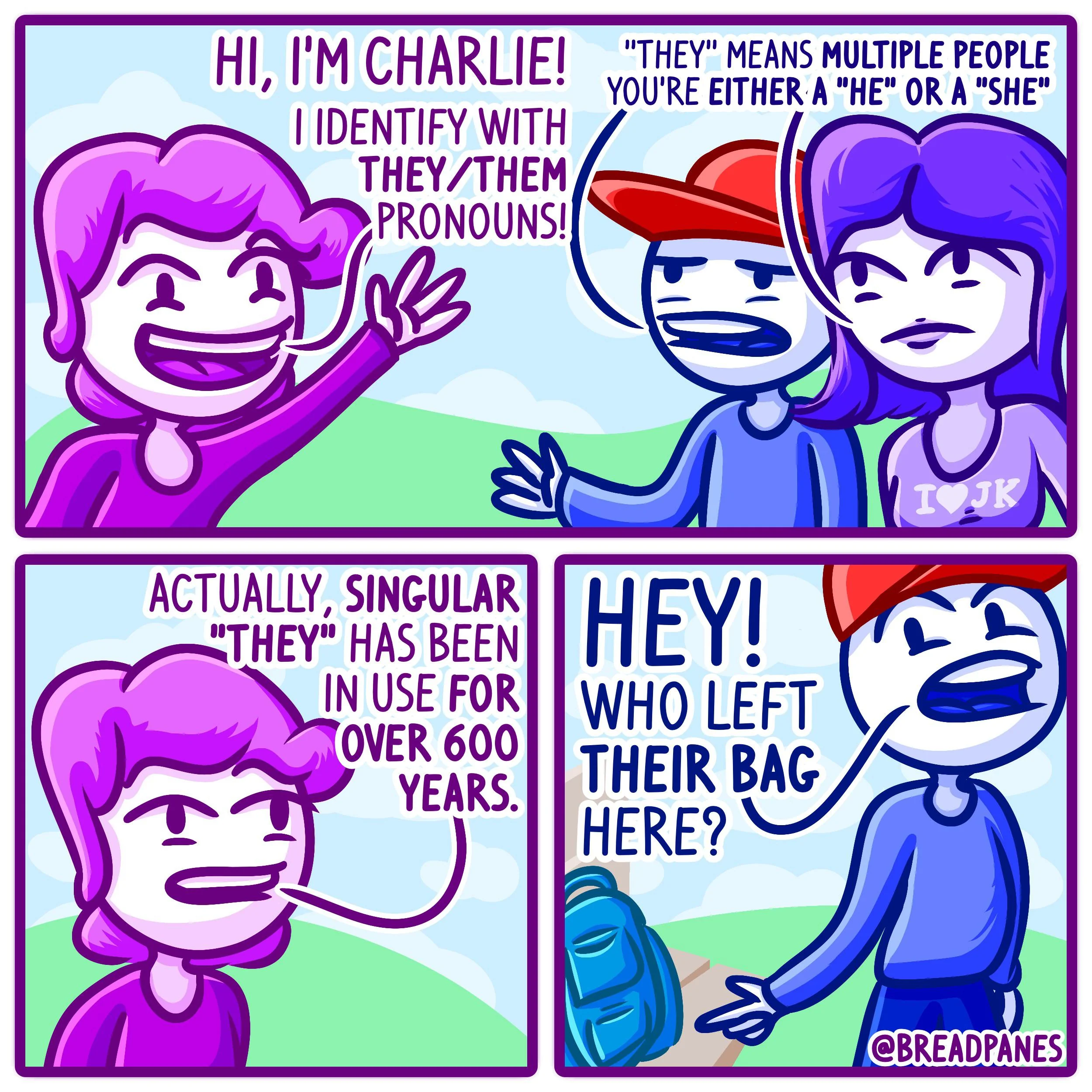They/Them
-
What are the two meanings (senses) of the word "he" in your sentence?
Dan or Steve is what I mean here — meanings within the context of their usage, not in an isolated sense. These meanings would both be described as "third person singular male pronoun" in a dictionary, but by the nature of a pronoun the whole point is for it to refer to something you've already talked about in context
The multiple senses of the pronoun in my sentence is the cause of the problem, not the multiple subjects.
We can test for this. If there's only one subject, Dan, then the sentence becomes:
"I was with Dan (they/them) the other day. They hadn't brought a poster they needed and went back to the car to get it."
No ambiguity there, it can only mean Dan. Similarly, with a single subject that consists of multiple people:
"I was with the newlyweds the other day. They hadn't brought a poster they needed and went back to the car to get it."
Exact same thing, no ambiguity. So we can use "they" in both senses and it's totally fine so long as there's only one subject. The ambiguity comes about when there are two possibilities already mentioned that the pronoun could potentially refer to — just like if Dan and Steve are both "he".
-
thanks for not doing anything then

-
[email protected]replied to [email protected] last edited by
No, that's incorrect.
It's "Thou are (art) tall"
Nominative Oblique Possessive Thou Thee Thy/Thine* I Me My/Mine* He Him His She Her Her/Hers** You You Your/Yours**- Used as an object (It is thine) or historically, when the following word started in the vowel (Thine eyes sparkle like diamonds)
** Used as an object (it is hers)
-
[email protected]replied to [email protected] last edited by
Yes I too, read the Wikipedia entry for thou/thee.
Are the Outlander writers just dumb or something then? Or is what you're referring to ("thou art") just a different context.
Because in Outlander, the quakers clearly use "thee is" and not "thou art/are".
Because they use it as the second person singular.
Minor spoilers for latest season of Outlander
-
Do you remember your conjugation tables from Spanish or French class?
English has them too, but the modern ones are much smaller than most (all?) other European languages.
-
I think because it's so small for English and because I'm a native speaker it's all just second nature and I don't really know the technicalities. Conjugating verbs in Spanish is one of my most frustrating areas of learning lol.
-
Yeah, it's only really "Be" and "have" that have any conjugation variety in English, and then the old 3rd singular +s and past tense and participles.
Since most English speakers don't learn much grammar it can be tricky.
A few lessons on English grammar would probably make learning a second language much easier. -
[email protected]replied to [email protected] last edited by
Well it kinda is. Names are like pronouns, in the sense that we use them to describe to whom we refer.
They are a non injective function on the name set.
The restriction you would like to make is that the function is not multivalued. But it is. As an example, Andrea is a name that is usually associated with a female person, but it is a normal name for male people in Italy.
-
[email protected]replied to [email protected] last edited by
Well it kinda is.
I disagree.
Pronouns are like names
Pronouns are not names.
-
Again, we're talking about different linguistic issues, which I'll demonstrate below. I see now that my example wasn't a good example because it conflates a consequence of the problem with the problem itself.
The ambiguity
There are two different ambiguities. You're talking about ambiguity over the subject whereas I'm talking about ambiguity over the sense of the pronoun.
"I was with Dan (they/them) the other day. They hadn't brought a poster they needed and went back to the car to get it."
No ambiguity over sense of "they". No ambiguity over subject.
"I was with the newlyweds the other day. They hadn't brought a poster they needed and went back to the car to get it."
No ambiguity over sense of "they". No ambiguity over subject.
"I was with Dan (he/him) and Steve (he/him) the other day. He hadn't brought a poster he needed and went back to the car to get it."
No ambiguity over sense of "he". Ambiguity over subject.
"I was with Dan (they/them) and Steve the other day. They hadn't brought a poster they needed and went back to the car to get it."
Ambiguity over sense of "they". Ambiguity over subject.
The ambiguity in the sense of the pronoun is the confusion. That's the problem. The ambiguity over the subject is a problem but not the problem I was talking about.
-
[email protected]replied to [email protected] last edited by
I disagree.
I disagree.
Pronouns are not names.
Yes, that is why I wrote "like". They serve the same functionality.
second
That is the first time you wrote second. That's very telling.


